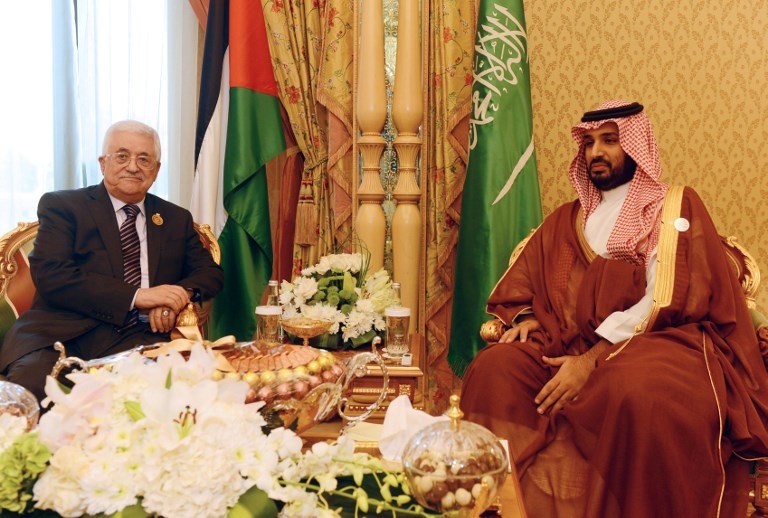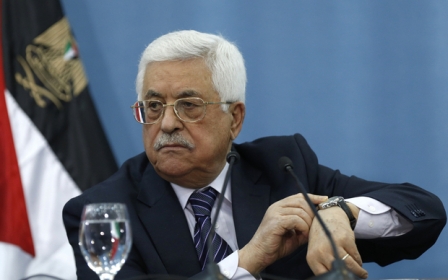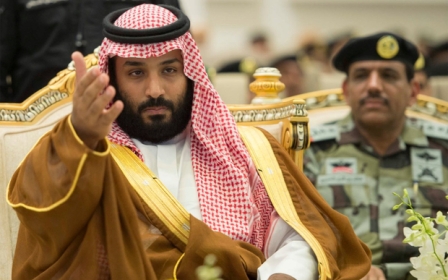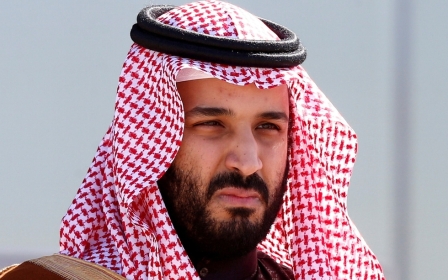Abbas in Riyadh: Saudis court Palestinian support for grand alliance with Israel

RAMALLAH - Saudi Crown Prince Mohammed Bin Salman invited Palestinian President Mahmoud Abbas to Riyadh this week as part of plans to form a grand regional alliance including both Israel and Palestine to confront Iran, Palestinian officials and western diplomats told Middle East Eye on Wednesday.
Abbas arrived in Riyadh on Monday following a weekend of drama and intrigue in which dozens of princes, former ministers and influential business tycoons were arrested and Lebanese Prime Minister Saad Hariri also announced his surprise resignation from the Saudi capital.
Officials and diplomats, speaking on condition of anonymity, told MEE that Abbas had been summoned to discuss renewed American efforts to secure a peace deal between Israel and the Palestinian Authority which the crown prince sees as a crucial step towards his goal of enabling Saudi Arabia and Israel to work together openly against Iran.
"The Arabs and the Israelis are facing two enemies, Iran and terrorism, and they must form an alliance to confront them," a western diplomat said, speaking on condition of anonymity.
"But this alliance cannot be established without resolving the Palestinian issue; Saudi Arabia cannot work openly with Israel in the face of Iran, before solving the Palestinian issue, and having the Palestinians themselves involved directly in such an axis."
Abbas is expected to return to Ramallah, the Palestinian Authority's political capital, later on Wednesday.
Palestinian officials, also speaking anonymously, told MEE that Abbas had met both King Salman and the crown prince and had been assured by them that Arab states would not establish formal diplomatic relations with Israel until Palestinian statehood was recognised and a regional peace deal had been agreed.
“President Abbas raised his concerns of the Israeli intention to implement the Arab Peace Initiative from Z to A, not from A to Z, meaning that Israel is interested in having a relationship with the Arab countries before having a Palestinian statehood,” one official said.
The Arab Peace Initiative refers to an Arab League-endorsed proposal dating from 2002 which offers recognition of Israel by Arab states in return for Israel's complete withdrawal from the West Bank and a "just solution" addressing the issue of Palestinian refugees displaced prior to the creation of Israel in 1948.
"The king and the crown prince assured President Abbas that will not happen. The Saudis are keen to keen to see a regional peace deal that solves the Palestinian cause first," the official said.
Majdi Khaldi, Abbas's diplomatic advisor who accompanied him on the visit to Riyadh, told Voice of Palestine radio on Tuesday, that the crown prince and Abbas had been in “constant contact” recently.
“Saudi Arabia has always stood with us, provided us with all the political and financial support we needed, and the time has come for us to stand with it in the face of great challenges," said Khaldi.
No common ground
Abbas’s arrival in Riyadh came days after a four-day visit by Jared Kushner, US President Donald Trump’s Middle East envoy who is preparing to launch a new regional peace initiative involving Saudi Arabia and its Gulf state allies.
But western diplomats said the US team was facing major obstacles because of the lack of any common ground between the two sides.
Palestinian negotiators want a Palestinian state based on the internationally recognised frontiers predating Israel’s occupation of the West Bank and East Jerusalem during the 1967 Arab-Israeli War. The Israeli government rejects any discussion of a peace deal based on the 1967 borders.
One western diplomat told MEE that the US team was keen to include the Palestinian issue within its regional diplomatic file to give Israel more incentives to accept a peace deal and to focus some Arab pressure on Abbas.
Israeli media said this week that the government had already started lobbying on behalf of Saudi Arabia against the common enemy of Iran, amid growing Israeli concern over Iranian influence in neighbouring Lebanon.
"Israel will launch an international diplomatic campaign against Iranian interference in Lebanon's political arena,” Israel’s Channel 10 reported on Monday.
The channel also said the Israeli Foreign Ministry on Sunday instructed Israeli embassies in the world to work in this direction.
“The ambassadors were asked to explain the support of Israel to Saudi Arabia in light of Iran's involvement in the war in Yemen [where Iran is alleged to back Houthi rebels] and in Lebanon,” it reported.
The crown prince’s diplomatic overtures to Abbas come amid competing efforts by Saudi Arabia, and its allies, and Iran for influence over Hamas, the Palestinian militant group that has controlled Gaza since 2007 but recently signed a deal with Abbas’s Fatah party to form a unity government.
The deal was signed after the UAE, a key Saudi ally, was reported to have agreed to pump $15m a month in aid into the enclave which has been blockaded by Israel since 2007.
But Hamas has also recently established closer ties with Iran, sending a senior delegation to Tehran earlier this year. In August, Hamas leader Yahya Sinwar described relations with Iran as “excellent” and said the country was the “largest supporter” of Hamas’s al-Qassam Brigades in terms of arms and money.
Earlier this month Saleh Arouri, the deputy chairman of Hamas’ political bureau, also held talks in Beirut with Hassan Nasrallah, the leader of Hezbollah amid reports that the Iran-backed Lebanese Shia movement was trying to restore ties between Hamas and Syria.
The reconciliation agreement between Fatah and Hamas, under which the PA would assume responsibility for security in Gaza, includes a four-month test phase known as the "Empowerment of the Government" in which the Fatah-controlled PA is supposed to assume control of government departments, crossings and security services in Gaza.
But doubts remain over whether the deal will hold because Hamas has said that any disarmament of the al-Qassam Brigades is a "red line" and has called for thousands of members of its existing security forces in Gaza to be integrated with the PA’s security apparatus.
Hazem Atallah, the head of the Palestinian police, on Wednesday called for Hamas to disarm to allow the unity deal to succeed.
"How can we do security work in the presence of these guns and rockets? This is not possible, it is impossible," Atallah said.
He added: "We security men are not the decision makers, and we implement what is decided by the political level, but I say that this is not possible."
The solution is to remove these weapons away, or bury them in the ground, Atallah said.
New MEE newsletter: Jerusalem Dispatch
Sign up to get the latest insights and analysis on Israel-Palestine, alongside Turkey Unpacked and other MEE newsletters
Middle East Eye delivers independent and unrivalled coverage and analysis of the Middle East, North Africa and beyond. To learn more about republishing this content and the associated fees, please fill out this form. More about MEE can be found here.




